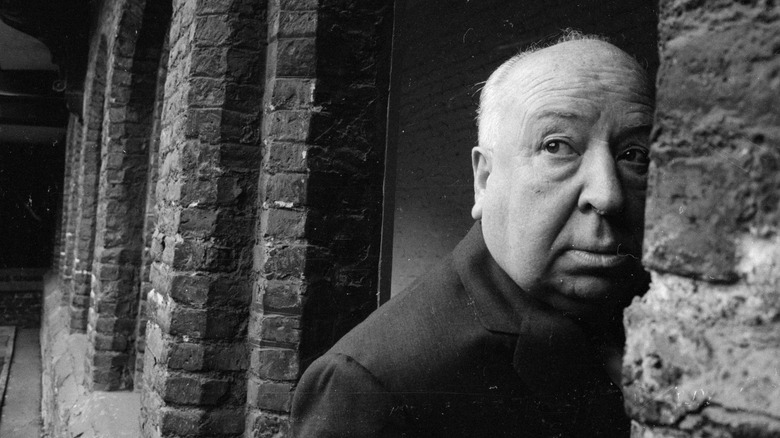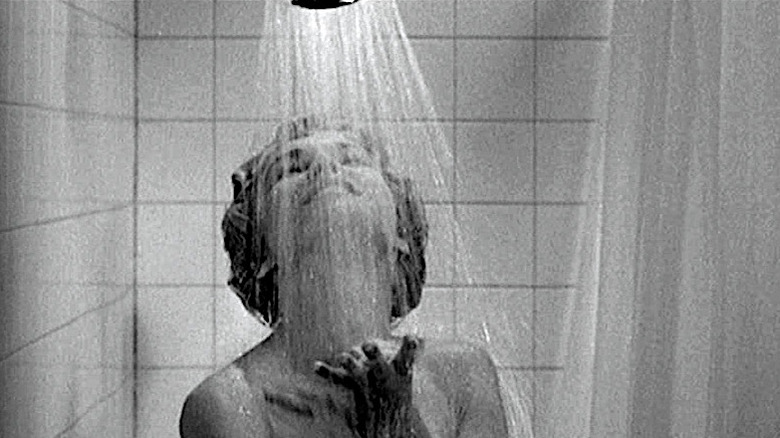How Alfred Hitchcock Changed Horror Movies Forever
You would be hard pressed to find anyone even remotely interested in film who didn't know who Alfred Hitchcock is. This famous filmmaker is as synonymous with cinematic history as the moon is important to the Earth we live on. His films often fall into the category of "thriller," but some of them occasionally bleed over into the horror genre. Hitchcock was a man constantly willing to play with and reinvent the tropes of the time to create something entirely new and often shocking, and modern-day horror is indebted to the "Master of Suspense" for his bold refusal to conform to the tropes of his time period.
"Psycho," Hitchcock's 1960 masterpiece about a mother-obsessed man who preys on and murders unsuspecting women, is considered by many to be his most famous film. In a lot of ways, this single film revolutionized the way movies were made, and it has had an especially significant effect on the horror genre. The '60s were an interesting time period for horror and gore in film. This decade saw the rise of various bloody and violent sub-genres of action and horror like giallos, Spaghetti Westerns, and splatter films, that would help to revolutionize the way violence is portrayed on screen. But without Hitchcock's "Psycho," this revolution might have taken a little longer.
Of course, movies had been slowly tip-toeing towards portraying racier elements of sex and gore on the big screen for a while — movies like the 1932 film "Thirteen Women" directed by George Archainbaud hinted at a certain kind of demented violence that would prove influential — but it was Hitchcock who made the first move towards actually showing those two things on screen. Today, it is "Psycho" that is often credited as being the first prototype to the modern-day slasher genre, and when we look back at the movie and its history, it's easy to see why.
It's Only a Little Gore, Mother!
When we think of slashers, we think of classics like "Halloween" and "Friday the 13th." The formula for these movies often involves a group of unsuspecting (and often idiotic) teens who overindulge in sex and debauchery only to meet their deaths at the hands of a rogue killer. This killer stalks his victims throughout the film leaving a trail of bodies in his wake until he is eventually stopped by the precocious, virginal "final girl" (a term first coined by Carol J. Clover in her famous essay "Her Body, Himself: Gender in the Slasher Film). It's a familiar formula to horror fans, and though it might be seen as predictable, there's no doubting its effectiveness.
The thing is, we might not have these famous slasher franchises if it wasn't for Hitchcock and "Psycho." With one film, he was able to revolutionize the horror genre. "Psycho" was unique for its time for the way it pushed the boundaries of what could be shown onscreen. In 1960, the on-screen murder of Marion Crane (Janet Leigh) as she indulges in a shower was so blasphemous that audience members and critics recoiled at Hitchcock's audacity. The shower scene was so effective for some viewers that they were certain they had seen more of Janet Leigh's body than they actually did.
Leigh's portrayal of Crane would lay the groundwork for the final girl trope, and though she dies halfway through the movie, her influence on the female horror hero can be seen in slashers to this day. Norman Bates (Anthony Perkins), the man responsible for the murders, would also go on to influence horror's most famous serial killers like Michael Meyers, Jason Voorhees, and Freddy Krueger.
By pushing the boundaries of what was deemed appropriate to show on camera, Hitchcock shocked his audience out of traditional expectations. "Psycho" thrilled and disturbed many of its viewers, but the movie went on to be Hitchcock's most successful movie ever. It seems people were so drawn to this more scandalous movie experience that they flocked to see the film for themselves. Hitchcock had hit on something remarkable with "Psycho." He understood that audiences wanted to experience violence and shock from the safety of their seats, and so he gave it to them. It's a good thing too, because without "Psycho," horror just might not be the same today.

